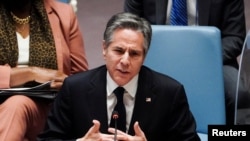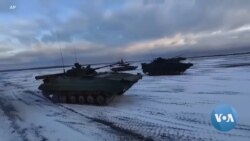U.S. Secretary of State Antony Blinken told the U.N. Security Council on Thursday that the world could expect to see Russia attack Ukraine within days and that intelligence information indicated it could be preceded by a fabricated pretext.
“This could be a violent event that Russia will blame on Ukraine, or an outrageous accusation that Russia will level against the Ukrainian government,” Blinken said. “We don’t know exactly the form it will take.”
He said some possibilities were a staged “terrorist” bombing inside Russia or a staged drone strike against civilians; even a fake or real chemical weapons attack is possible, he said.
Blinken arrived in New York after a last-minute change to his travel plans to convey the gravity of the situation. He is on his way to meet other leaders at the Munich Security Conference on Friday.
“Our information clearly shows that Russian forces on the Ukrainian borders, including ground forces and aircraft, are preparing to launch an attack on Ukraine in the coming days,” he said.
U.S. officials, including Blinken, have put the number of Russian forces poised on the Ukrainian border at more than 150,000.
'In plain sight'
He said a Russian attack would include missile and bomb strikes, cyberattacks on key Ukrainian institutions and ground attacks on vital targets, including the capital, Kyiv, which is home to nearly 3 million people.
“Let me be clear: I am here today not to start a war, but to prevent a war. The information I’ve presented here is validated by what we’ve seen unfolding in plain sight before our eyes for months,” he said.
He urged the Russian government to clearly announce that it would not invade Ukraine.
“State it clearly. State it plainly to the world,” he said. “And then demonstrate it by sending your troops, your tanks, your planes back to their barracks and hangars and sending your diplomats to the negotiating table.”
Blinken said the Biden administration had received a written response Thursday to the proposals it sent Moscow three weeks ago on reciprocal steps to address collective security interests in Europe. Blinken said the U.S. was evaluating the reply. He also said he had written to his Russian counterpart, Sergey Lavrov, proposing they meet in Europe next week.
Lavrov’s deputy, Sergey Vershinin, chaired Thursday’s meeting, as Russia holds the rotating presidency of the U.N. Security Council this month.
Western ‘hysteria’
Vershinin dismissed Western accusations that Moscow was not upholding its obligations under the Minsk agreements, which are a framework for peacefully resolving the crisis in eastern Ukraine.
“We have long ago clarified and explained everything,” he said.
“Attempts to place the blame on Russia are futile and baseless,” he added, saying they were intended only to shift blame away from Ukraine.
After the meeting, he told reporters Western governments should “stop this hysteria” about a Russian invasion.
“We reiterated very firmly our commitment to the de-escalation and the peaceful solution of this crisis, once more being based on the Minsk agreements,” he said.
On Thursday, Russia also expelled the U.S. deputy ambassador in Moscow, a move White House deputy press secretary Karine Jean-Pierre said was “unprovoked.” Vershinin did not respond to reporters’ questions about it.
“Drawing lessons from the past, we urge Russia to abandon its long-lasting strategy on Ukraine based on threats and use of force against the territory of Ukraine,” Kyiv’s U.N. ambassador, Sergiy Kyslytsya, told the council.
'Ukraine wants peace'
“Ukraine remains committed to a peaceful resolution of the Russian-Ukrainian conflict by political-diplomatic means,” he said. “Ukraine wants peace, security and stability, not only for itself, but also for the entire Europe.”
But he cautioned that if Russia chose military escalation, Ukraine would defend itself.
Other council members, including Russia’s ally China, urged de-escalation and diplomacy.
Also Thursday, NATO allies accused Russia of spreading “disinformation” about pulling back troops and Ukrainian forces, and Russia-backed separatists accused each other of intensive shelling along the line that separates them in eastern Ukraine.
Russia continues to deny it is planning to invade Ukraine and maintains it can rightfully deploy troops where it feels necessary to offset threats from NATO. The Kremlin wants the West to disallow Ukraine and other former Soviet nations from joining NATO, end weapons deployments near its borders and withdraw forces from Eastern Europe. Western allies have rejected all of Russia’s demands.
Some information for this report came from The Associated Press, Agence France-Presse and Reuters.






